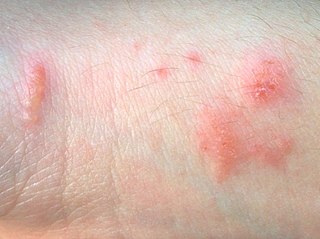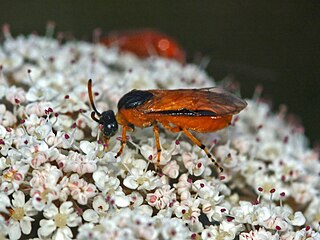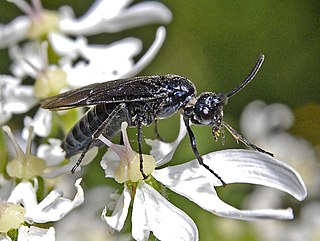
Toxicodendron radicans, commonly known as eastern poison ivy or poison ivy, is an allergenic Asian and Eastern North American flowering plant in the genus Toxicodendron. The species is well known for causing urushiol-induced contact dermatitis, an itchy, irritating, and sometimes painful rash, in most people who touch it. The rash is caused by urushiol, a clear liquid compound in the plant's sap. The species is variable in its appearance and habit, and despite its common name, it is not a true ivy (Hedera), but rather a member of the cashew and pistachio family (Anacardiaceae). T. radicans is commonly eaten by many animals, and the seeds are consumed by birds, but poison ivy is most often thought of as an unwelcome weed. It is a different species from western poison ivy, Toxicodendron rydbergii, which has similar effects.

Poison Ivy is a fictional supervillain appearing in comic books published by DC Comics, commonly in Batman stories. Poison Ivy was created by Robert Kanigher and Sheldon Moldoff, and made her debut in Batman #181.

Sawflies are the insects of the suborder Symphyta within the order Hymenoptera alongside ants, bees and wasps. The common name comes from the saw-like appearance of the ovipositor, which the females use to cut into the plants where they lay their eggs. The name is associated especially with the Tenthredinoidea, by far the largest superfamily in the suborder, with about 7,000 known species; in the entire suborder, there are 8,000 described species in more than 800 genera. Symphyta is paraphyletic, consisting of several basal groups within the order Hymenoptera, each one rooted inside the previous group, ending with the Apocrita which are not sawflies.

Urushiol-induced contact dermatitis is a type of allergic contact dermatitis caused by the oil urushiol found in various plants, most notably species of the genus Toxicodendron: poison ivy, poison oak, poison sumac, and the Chinese lacquer tree. The name is derived from the Japanese word for the sap of the Chinese lacquer tree, urushi. Other plants in the sumac family also contain urushiol, as do unrelated plants such as Ginkgo biloba.

Arge pagana is a sawfly in the family Argidae. It is known by the name "large rose sawfly" although the related species Arge ochropus is also known by this name.

Arge scapularis or elm argid sawfly is a sawfly in the family Argidae. It is found across North America and commonly infests elm trees. The name "scapularis" refers to the insect's distinctive so-called "shoulder blades".

Poison ivy is an allergenic plant in the genus Toxicodendron native to Asia and North America. It is well known for causing urushiol-induced contact dermatitis, an itchy, irritating, and sometimes painful rash, in most people who touch it. The rash is caused by urushiol, a clear liquid compound in the plant's sap. The plant is variable in its appearance and habit, and despite its common name, it is not a true ivy (Hedera), but rather a member of the cashew and pistachio family (Anacardiaceae). T. radicans is commonly eaten by many animals, and the seeds are consumed by birds, but poison ivy is most often thought of as an unwelcome weed. Poison ivy was formerly treated as a single species, Toxicodendron radicans, but is now generally treated as a complex of three separate species: Toxicodendron radicans, Toxicodendron rydbergii and Toxicodendron orientale.

Arge cyanocrocea, the bramble sawfly, is a species of sawflies of the family Argidae, subfamily Arginae.

Arge ochropus, the rose sawfly, is a species belonging to the family Argidae subfamily Arginae.

Arge is a genus of sawflies belonging to the family Argidae subfamily Arginae.

Arge melanochroa is a species of the family Argidae, subfamily Arginae.

Arge berberidis, common name berberis sawfly, is a species of sawflies belonging to the family Argidae subfamily Arginae.

Eriocampa ovata, known generally as the alder sawfly or woolly alder sawfly, is a species of common sawfly in the family Tenthredinidae. The larvae feed on the leaves of the common alder and the grey alder, sometimes causing defoliation.

Eriocampa is a genus of common sawflies in the family Tenthredinidae. There are about ten described species in Eriocampa.

Neoptilia is a genus of argid sawflies in the family Argidae. There are at least two described species in Neoptilia.

Arge pectoralis, the birch sawfly, is a species of argid sawfly in the family Argidae.
Fidia humeralis is a species of leaf beetle. It ranges from southeastern Arizona and southwestern New Mexico, along the Sierra Madre Occidental and Sierra Madre del Sur, south to Oaxaca in southwestern Mexico. It was first described as two species, Fidia humeralis and Fidia plagiata, by the French entomologist Édouard Lefèvre in 1877. These two species were later found to be synonymous.
Thecesternus humeralis is a species of broad-nosed weevil in the beetle family Curculionidae. It is found in North America.
Brachypnoea lecontei is a species of leaf beetle. It occurs in the Great Plains of the United States. In Texas, it is known to feed on Texas live oak.
Adaleres humeralis is a species of broad-nosed weevil in the beetle family Curculionidae. It is found in North America.
















